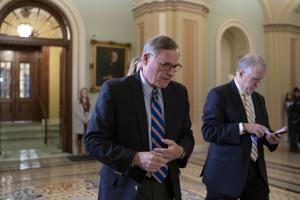Burr, Tillis: Time to end federal unemployment in North Carolina

(The Center Square) – Add Republican North Carolina U.S. Sens. Richard Burr and Thom Tillis to the list of people calling on Gov. Roy Cooper to withdraw from federal unemployment programs to address worker shortages.
Burr and Tillis issued a joint statement Wednesday that said a lack of employees to fill jobs in North Carolina was the result of “exorbitant” federal unemployment benefits and a threat to the state’s economic recovery from the COVID-19 pandemic.
“Over the last several weeks, we’ve heard from countless small, mid, and large-sized business owners across North Carolina struggling to hire enough workers to reopen this summer,” the statement said. “Employers, particularly in hard-hit industries like tourism, service, and hospitality, are finding they can’t compete with excessive federal benefits. Time is running out for industries that rely on the summer season for a large portion of their business.”
Republicans in the North Carolina General Assembly last week sent a letter to Cooper looking to restore the state’s work-search requirement to be eligible for unemployment benefits. A House bill also was amended to require the work-search mandate and offer return-to-work bonuses.
Cooper signed an executive order hours later to restore the state’s work-search requirement for unemployment benefits.
About 59% of the state’s civilian labor force is employed, according to a North Carolina Department of Commerce report published Friday. There are 250,000 people receiving unemployment benefits weekly, data show. Republicans said Friday there are 200,000 job openings on the state’s workforce system, NCWorks.
North Carolina restaurants are down about 70,000 workers – or 17% of the industry’s workforce – compared with before the pandemic, the North Carolina Restaurant and Lodging Association said.
“Governor Cooper needs to acknowledge the existence of a problem and take action to fix it,” Burr and Tillis’ statement said. “While the governor recently announced he will finally start reinstating the job search requirement, that’s merely enforcing existing law. It’s not enough. The governor should immediately end expanded federal unemployment insurance and focus on incentives to encourage more people to return to the workforce, as nearly half of states already have.”
An amended House Bill 128 in the North Carolina General Assembly would require unemployment claimants to respond to interview requests within 48 hours and employers to report claimants who do not. Unemployed workers could lose their benefits if they fail to respond to interview requests, schedule an interview in seven days or show up for an interview or other reemployment activities.
HB 128 also authorizes $1,500 or $800 bonus payments for claimants to return to work. Unemployed workers who accept jobs on or before June 1 would qualify for two $750 checks within 60 days of reemployment, under the current version of the proposal. Workers who accept jobs on or before July 1 would receive two $400 installments within 60 days of reemployment.
North Carolina’s unemployment rate has decreased by 8.5 percentage points since April 2020 – the peak of unemployment during the COVID-19 pandemic. Cooper ordered most businesses closed at the end of March 2020, pushing the unemployment rate to 13.5%.
“Thanks to growing vaccinations and the heroic efforts of our health care workers, America is turning the tide in the fight against COVID-19,” Burr and Tillis said. “We won’t have truly recovered from this pandemic, however, until North Carolina’s economy and workers are back in full force.”
• The Center Square staff reporter Nyamekye Daniel contributed to this report.
Disclaimer: This content is distributed by The Center Square


